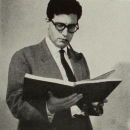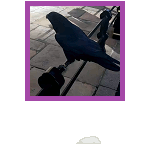|
Welcome earthlings to the Awful Book of the Month! In this thread, we choose one work of Resources: Project Gutenberg - http://www.gutenberg.org - A database of over 17000 books available online. If you can suggest books from here, that'd be the best. SparkNotes - http://www.sparknotes.com/ - A very helpful Cliffnotes-esque site, but much better, in my opinion. If you happen to come in late and need to catch-up, you can get great character/chapter/plot summaries here.  For recommendations on future material, suggestions on how to improve the club, or just a general rant, feel free to PM me. For recommendations on future material, suggestions on how to improve the club, or just a general rant, feel free to PM me.  Past Books of the Month [for BOTM before 2014, refer to archives] 2014: January: Ursula K. LeGuin - The Left Hand of Darkness February: Mikhail Bulgalov - Master & Margarita March: Richard P. Feynman -- Surely You're Joking, Mr. Feynman! April: James Joyce -- Dubliners May: Gabriel Garcia Marquez -- 100 Years of Solitude June: Howard Zinn -- A People's History of the United States July: Mary Renault -- The Last of the Wine August: Barbara Tuchtman -- The Guns of August September: Jane Austen -- Pride and Prejudice October: Roger Zelazny -- A Night in the Lonesome October November: John Gardner -- Grendel December: Christopher Moore -- The Stupidest Angel 2015: January: Italo Calvino -- Invisible Cities February: Karl Ove Knausgaard -- My Struggle: Book 1. March: Knut Hamsun -- Hunger April: Liu Cixin -- 三体 ( The Three-Body Problem) May: John Steinbeck -- Cannery Row June: Truman Capote -- In Cold Blood (Hiatus) August: Ta-Nehisi Coates -- Between the World and Me September: Wilkie Collins -- The Moonstone October:Seth Dickinson -- The Traitor Baru Cormorant November:Svetlana Alexievich -- Voices from Chernobyl December: Michael Chabon -- Gentlemen of the Road 2016: January: Three Men in a Boat (To say nothing of the Dog!) by Jerome K. Jerome February:The March Up Country (The Anabasis) of Xenophon Current: https://www.youtube.com/watch?v=7-yYJgpQ-CE The Name of the Rose by Umberto Eco This is a difficult book; this is a gripping book. quote:
http://www.postmodernmystery.com/name_of_the_rose.html quote:The year is 1327. Franciscans in a wealthy Italian abbey are suspected of heresy, and Brother William of Baskerville arrives to investigate. When his delicate mission is suddenly overshadowed by seven bizarre deaths, Brother William turns detective. His tools are the logic of Aristotle, the theology of Aquinas, the empirical insights of Roger Bacon—all sharpened to a glistening edge by wry humor and a ferocious curiosity. He collects evidence, deciphers secret symbols and coded manuscripts, and digs into the eerie labyrinth of the abbey, where “the most interesting things happen at night.” quote:There is a kind of novel that changes our mind, replaces our reality with its own. We live in a new world after we've read it. Umberto Eco, the celebrated Bolognese semiotican and Joyce scholar, brings us a new world in the tradition of Rabelais, Cervantes, Sterne, Melville, Dostoevsky, Joyce himself, and Garcia-Marquez. http://www.latimes.com/books/jacketcopy/la-et-jc-name-of-the-rose-umbert-eco-20160219-story.html Historical Context: The book takes place in the 1300's, as noted above, and is DEEPLY rooted in contemporary Italian and Catholic history, to the point where even a brief summary is beyond the scope of this introduction. Dive in, we'll learn as we go. About the Author quote:Umberto Eco OMRI (Italian: [umˈbɛrto ˈɛːko]; 5 January 1932 – 19 February 2016) was an Italian novelist, essayist, literary critic, philosopher and semiotician. He is best known for his groundbreaking 1980 historical mystery novel Il nome della rosa (The Name of the Rose), an intellectual mystery combining semiotics in fiction, biblical analysis, medieval studies and literary theory. He later wrote other novels, including Il pendolo di Foucault (Foucault's Pendulum) and L'isola del giorno prima (The Island of the Day Before). His novel Il cimitero di Praga (The Prague Cemetery), released in 2010, was a best-seller. quote:Eco began seriously developing his ideas on the "open" text and on semiotics, writing many essays on these subjects, and in 1962 he published Opera aperta (translated into English as "The Open Work"). In it, Eco argued that literary texts are fields of meaning, rather than strings of meaning, that they are understood as open, internally dynamic and psychologically engaged fields. Literature which limits one's potential understanding to a single, unequivocal line, the closed text, remains the least rewarding, while texts that are the most active between mind, society and life (open texts) are the liveliest and best—although valuation terminology is not his primary focus. Eco came to these positions through study of language and from semiotics, rather than from psychology or historical analysis (as did theorists such as Wolfgang Iser, on the one hand, and Hans Robert Jauss, on the other). https://en.wikipedia.org/wiki/Umberto_Eco An interview with Eco here: http://www.theparisreview.org/interviews/5856/the-art-of-fiction-no-197-umberto-eco Discussion, Questions & Themes: quote:The title is unexplained in the book. As a symbol, the rose is ubiquitous enough to not confer any single meaning. Pacing Since this is a mystery, let's use spoiler tags for anything in the last third of the book or anything that might give away the answers. References and Further Reading Oh good lord. Literally everything. I've ordered a copy of The Key to the Name of the Rose and will go through it once it arrives and post helpful comments. Which Edition? Which Translation? Make sure to get a copy that has the author's afterword/postscript at the end. Final Note: One final note on this book. It is deliberately intimidating. But the author intended that and front-loaded most of the pain. . If you can get through the abbey doorway, whether by reading it or skipping the boring parts or whatever -- literally, he wrote the abbey doorway as a difficulty threshold to scare away readers not up to the challenge -- you can make it through the rest of the book. The threshold is the greatest challenge. Edit: in the author's own words, quoted from the postscript: quote:
Hieronymous Alloy fucked around with this message at 20:56 on Mar 5, 2016 |
|
|
|
|

|
| # ? May 3, 2024 06:19 |
|
Yeah, really don't get scared. I reread this, Foucault's Pendulum and Baudolino every couple of years and they are all great novels once you get past the challenge. I'm not sure if it was the author's intent but think of it as an initiation rite - you have to brave some obtuse prose to get to the juicy plot that follows and it's entirely possible to read them as a historical whodunit story. Or semiotics 101. Or whatever the hell you want.
|
|
|
|
|
I'm in; I've read this bad boy a few times before but it's been enough years since the last time.
|
|
|
|
I don't have the English translation on my shelf, but nevermind that, haven't read this in years.
|
|
|
|
It's actually one of the few Eco books I haven't read.
|
|
|
|
I'm gonna participate in this one. I'll start reading this weekend.
|
|
|
|
I read this book last year and loved it. I'd love to read it again to see what all I missed on my first read through.
|
|
|
|
Bummer, my ebook edition does not have the postscript (which sounds fascinating). I think I'm about due to re-read this though -- probably plenty to catch on a second read.
|
|
|
|
I read this book last year and then afterwards I read about the supposed "difficulty" of the Abbey door passage. My response was, really? That's it? I thought that was an interestingly written section.
|
|
|
|
I never had any issues with it either, but it and the museum section at start of Foucault's Pendulum apparently result in a lot of people stopping reading.
|
|
|
|
|
The preface starting with the end of the Prague Spring is really good thematic introduction.
|
|
|
BravestOfTheLamps posted:The preface starting with the end of the Prague Spring is really good thematic introduction. I was thinking the same thing. It sets everything up so well -- it's so firmly placed in history ("six days later Soviet troops invaded that unhappy city") that it feels real, right off the bat, but at the same time he introduces so much doubt . . . .
|
|
|
|
Hieronymous Alloy posted:I was thinking the same thing. It sets everything up so well -- it's so firmly placed in history ("six days later Soviet troops invaded that unhappy city") that it feels real, right off the bat, but at the same time he introduces so much doubt . . . . Then again, they could've easily just replaced the thing with something along the lines of "requested assistance by peacekeeping forces" so I guess it got off lightly enough.
|
|
|
|
|
Hieronymous Alloy posted:I was thinking the same thing. It sets everything up so well -- it's so firmly placed in history ("six days later Soviet troops invaded that unhappy city") that it feels real, right off the bat, but at the same time he introduces so much doubt . . . . You also get a terrific sense of "the more things change"... the novel is about violence and chaos throwing intellectuals off their merry little orbit. And it's all in the same context of international politics, like the Fraticelli question. BravestOfTheLamps fucked around with this message at 22:55 on Mar 5, 2016 |
|
|
|
This book is amazing, I'm loving it so far. I've only gotten to the bit where the abbott is telling William to solve the murder mystery without entering the library.
|
|
|
|
I bought the audiobook to listen to at work this week. I'm 5 hours into the 21 total hours and I don't want it to ever stop.
|
|
|
|
The doorway was shorter than i remembered. Kind of disappointing.
|
|
|
|
I decided to read it in Italian this time. Let's see how it goes.
|
|
|
|
I've been meaning to dive into Eco's stuff for a while now and I'm happy this got selected as BOTM cause otherwise I would've probably just put it off longer. I'm halfway through and I'm blown away by how precise and beautiful the writing is. The history lessons are super interesting too. This pairs well with the Meister Eckhart stuff I've been reading on and off lately.
|
|
|
|
Lil Mama Im Sorry posted:I've been meaning to dive into Eco's stuff for a while now and I'm happy this got selected as BOTM cause otherwise I would've probably just put it off longer. I'm halfway through and I'm blown away by how precise and beautiful the writing is. The history lessons are super interesting too. If you've not read Foucault's Pendulum it's definitely something you'd like a lot. V occulty.
|
|
|
|
CestMoi posted:If you've not read Foucault's Pendulum it's definitely something you'd like a lot. V occulty. Probably going to read it right after I finish Rose.
|
|
|
|
One thing I kind of skimmed past in my first reading was how many times the characters refer to the end of the world approaching. First the elderly Adso makes reference to the Antichrist in the prologue, and then the abbot makes reference to the coming end of the world during his talk with William. That's definitely something I'll be watching out for this time.
|
|
|
|
It was a big theme in medieval thinking. First they all expected it in 1000 AD, then it was more or less a by-product of just about everyone calling their political enemies the Antichrist.
|
|
|
|
|
Chapter 109's tangent into his love of the prostitute and by extension his admiration at all creation is extremely mystical and beautiful. My favorite part of the book so far.
|
|
|
|
This is a really good book. I was a bit intimidated by the beginning, and all the factions mentioned, the number of characters introduced, but it really starts to come together and it becomes easy to remember who is who and who is a part of what faction, and what each faction represents. I don't have the greatest memory so this morning when I was thinking about what I had read I was surprised to realize I could name almost every character from memory and who they were in the story. They all have such unique personalities and rolls in the story. I love both the mystery, the secondary story, and the chapters that just kind of touch on a subject not really related to either, or are related, but don't move the actual story along. Toward the end of the book: The inquisition of Remigio and subsequent confession of his crimes was one of my favorite chapters and right after we get a great sermon by Jorge about the coming apocalypse which I loved. I should be done with this book tonight, can't wait to see where it goes in the end. I'm considering reading Foucault's Pendulum now.
|
|
|
|
Rusty posted:
I really enjoyed Foucault's Pendulum but it didn't really grab me until half way through. Also, I never realized that Ubertino was actually a real person. When the book listed everything he had done I thought it was weird to create such an intricate backstory for such a small side character, but it's really cool that Eco could work in a real person into the novel that well. It speaks to his ability as a writer that Ubertino fits in so well with his fictional characters.
|
|
|
|
TheManFromFOXHOUND posted:I really enjoyed Foucault's Pendulum but it didn't really grab me until half way through. Everything in Foucault's Pendulum is real. Not as in actually real, but based on actual conspiracy theories, books, people, illustrations and so on. e: remember this? 
Take the plunge! Okay! fucked around with this message at 16:27 on Mar 14, 2016 |
|
|
|
mcustic posted:Everything in Foucault's Pendulum is real. Not as in actually real, but based on actual conspiracy theories, books, people, illustrations and so on. You're right about Foucault's Pendulum, but Ubertino is a character in the book we are supposed to be talking about Anyway, does anyone know of someplace to read up on the significance of the big rear end door at the beginning? I feel like I'm missing some of the symbolism there and I'm sure somebody's written something about it.
|
|
|
|
Can anybody point to an ebook that includes the postscript? Kobo has a preview that lists it in the table of contents, but it's not actually there.
|
|
|
|
Rand Brittain posted:Can anybody point to an ebook that includes the postscript? Kobo has a preview that lists it in the table of contents, but it's not actually there. My Kindle version has the postscript. Also, I finished reading this today. Holy poo poo is this pretty much the perfect book. An Italian giallo in book form with descriptions that are just as beautiful (I loved the mysticism too). Anywayz, really fun read, I was hooked from the beginning and completely entranced the whole time. I'm really disappointed that Audible only has the abridged version of Foucault's Pendulum.
|
|
|
Lil Mama Im Sorry posted:My Kindle version has the postscript. Does your Kindle edition say which edition it is? There is more than one eBook version. edit: ebook edition I have that has the postscript is Mariner Books, Harcourt, says "including the author's postscript" on title page. Hieronymous Alloy fucked around with this message at 00:33 on Mar 16, 2016 |
|
|
|
|
Hieronymous Alloy posted:Does your Kindle edition say which edition it is? There is more than one eBook version. Mine is the Mariner Books version but the cover says nothing about postscript, just a quote from the NYT.
|
|
|
|
Just found out Eco died. RIP Going to reread this, Baudolino, and Foucaults in remembrance
|
|
|
|
I really didn't enjoy the Foucault's Pendulum experience - really quite tedious, but the first 50 pages of the name of the rose is really enjoyable. Perhaps I'm perverse, since others have said it's front loaded with pain, but the writing of the back story of Ubertino, the introduction of Salvatore and the description of the stone carvings inside the church wonderful.
|
|
|
|
Need suggestions for next month.
|
|
|
|
|
knees of putty posted:I really didn't enjoy the Foucault's Pendulum experience - really quite tedious, but the first 50 pages of the name of the rose is really enjoyable. Perhaps I'm perverse, since others have said it's front loaded with pain, but the writing of the back story of Ubertino, the introduction of Salvatore and the description of the stone carvings inside the church wonderful. I thought Foucault picked up the moment Casaubon gives a funny version of the history of the Templars to fit in with the sarcastic Belbon but feels super bad about it later because he rather liked the Templars. It's really the dialogues and interactions between the characters that make Foucault's Pendulum great, in my opinion.
|
|
|
|
Well, it was a long time ago. Enjoying the name of the rose sufficiently to think it worth going back to Foucault.
|
|
|
|
I felt that Foucault was more of an academic history book about a past that never actually happened than a novel. A few chapters into Rose now, enjoying reading about medieval Sherlock Holmes and Watson.
|
|
|
|
Hieronymous Alloy posted:Need suggestions for next month. Perfume: Story of a Murderer by Süskind
|
|
|
|

|
| # ? May 3, 2024 06:19 |
|
I may be a little off topic, but one of the great things about Focault's Pendulum for me was how it described Italian post WW2 politics on the margins of the main plot. Not as markedly as The Name of the Rose does with medieval Italian politics, but it was there.
|
|
|























